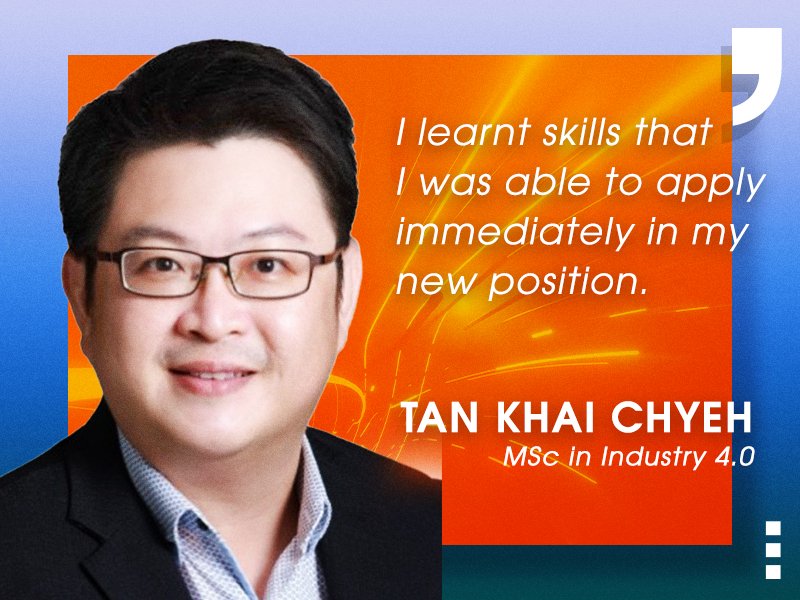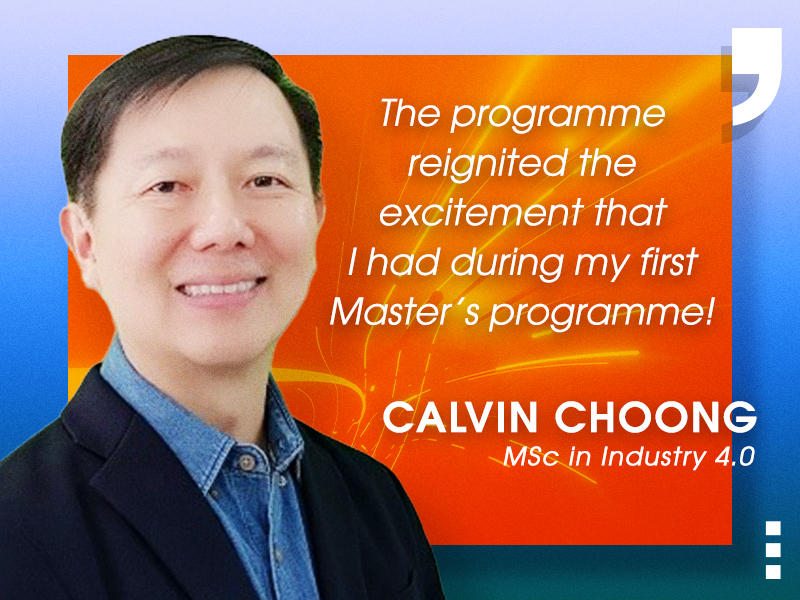**The Master of Science (Industry 4.0) programme has been renamed to the MSc (Smart Industries and Digital Transformation) programme**
Would you go back to school in your forties? Many of us would balk at the thought of having to put our work on hold, especially around the age where we would normally be established in our jobs.
Studies show that learning is no longer limited to specific life periods or age groups1. Lifelong learning will be part and parcel of this process due to advancements in technology and global developments. With the changes occurring in industry and the way we work, there is a danger that jobs and skills will become obsolete, being replaced by automation or technological upgrades.
As the Austrian-American author Peter Drucker said: “We now accept the fact that learning is a lifelong process of keeping abreast of change. And the most pressing task is to teach people how to learn.”
As a leader in education, the National University of Singapore (NUS) encourages lifelong learning among all its students. The University's academic programmes offers broad, interdisciplinary competencies that allow for opportunities to deep dive into wide-ranging areas of interest. Continuing education and training programmes are readily available for adult learners to upgrade themselves, from short courses and graduate certificates to postgraduate programmes.

In this article, we shine the spotlight on two adult learners who understand the importance of lifelong learning with regards to their respective career goals. They went back to school in their middle age in order to prepare themselves for the new challenges that are coming in the future.
Tan Khai Chyeh
Tan Khai Chyeh, as the Commercial Operations Director of a multinational corporation (MNC), was deeply involved in operations for the Southeast Asia region. He had risen quickly within the organisation. Then, he found himself in a dilemma. Although he was in a senior position, he was concerned about how employable he would be. To remain competitive, he felt that he needed to upskill himself.
He considered pursuing a Master in Business Administration degree, but ultimately concluded that the Master of Science in Industry 4.0 (MSc in Industry 4.0) programme best met his needs. It would allow him opportunities to network with other students who were at management level as well as to pick up future-oriented skills such as machine learning, artificial intelligence, block chain, and digital supply chain—all of which would be in high demand in the future economy.

However, upgrading himself would come at a price. His position at the time encompassed numerous work commitments due to frequent overseas travel and night calls. He did not have much free time, certainly not enough to pursue studies at the Master’s Degree level. Khai Chyeh decided to take a calculated risk, to put himself first. He took up a new position—switching from regional to local—in order to find the time to concentrate on his studies. He also received a Skillsfuture Study Award, which helped offset his tuition fees.
Joining the MSc in Industry 4.0 programme was indeed the right move for Khai Chyeh. “Modules teaching digital transformation, digital supply chain and digital business were very applicable. From those courses, I learnt skills that I was able to apply immediately in my new position,” he shared.
Having started his career in supply chain management a decade ago, he was keenly aware of the impact of technology and digitalisation on the industry. Back in the day, brick-and-mortar stores were the main mode of retail sales; the supply chain functioned mainly to ensure continuity was maintained from the production line to the stores. Nowadays, with the adoption of the Internet of Things (IoT), eCommerce and Artificial Intelligence enabling a new set of capabilities throughout the entire process, supply chain management has ascended to a more pivotal role in ensuring on-time deliveries and managing customer satisfaction.
Although Khai Chyeh has more than a decade of experience in his field, he remains open to learning and adapting to whatever changes happen in the industry. With the skills learnt from the programme, he is able to drive initiatives to provide the visualisation of performance and transformation of the supply chain to drive customer satisfaction.

Calvin Choong
Calvin Choong was a veteran in the telecommunications industry. Over the course of more than ten years, he steadily climbed the ranks in his company. During this time, his passion for education remained constant. After completing his Master’s Degree programme in Communication and Computer Networking, he felt that it was time to make a switch, to take up a role in education. He took a leap of faith and started teaching part-time at higher learning institutes such as UniSIM (now known as SUSS) and Nanyang Polytechnic.
Even though he had successfully ventured into his desired field, he still felt compelled to do more. He wanted to be an effective educator, capable of teaching learners of all ages: youths as well as adults. Calvin turned to further education, taking up a Post Graduate Diploma in Education (PGDE) in 2009, and an Advanced Certificate in Training and Assessment (ACTA) in 2019.
When the MSc in Industry 4.0 was launched, he was drawn to its curriculum. “As someone with an interest in lifelong learning, the programme reignited the excitement that I had during my first Master’s programme!” Calvin said with obvious excitement. The programme addressed the disruptions that were occurring in various industries, and taught the skills needed to lead transformation in the workplace.
Although it had been some time since he went back to school as a full-time student, the experience that he had in the MSc in Industry 4.0 programme as an adult learner was both pleasant and enjoyable. This was due in part to the fact that the university staff and professors were unwaveringly approachable and helpful during his time there.
He also worked on team projects and group assignments with a diverse group of classmates, which enriched his knowledge, not only about the curriculum, but also people management. He learned how to work around team members’ weaknesses and how to capitalise on their strengths to produce the best possible results.
Upon graduation, Calvin returned to teaching, conducting classes on Data Science-related subjects like data engineering, machine learning, and digital transformation. “The exposure that I have received in the field of Data Science from the MSc in Industry 4.0 programme has allowed me to upskill in this next phase of my career. It has opened more doors for me,” he said.
His age also allows him to connect with adult learners at a personal level, understanding the challenges that they face, especially with learning and applying new technologies in their workplaces.
Despite his many academic qualifications, Calvin is still eager to upgrade himself. He confessed that learning stimulates him, so he enjoys pushing himself to gain a deeper understanding across a wide range of subjects. Furthermore, he feels that in the field of Data Science, every day offers a new learning experience.
As can be seen from the stories above related by Khai Chyeh and Calvin, different people may have different forces driving their pursuit of lifelong learning. Some are motivated by the desire to remain employable, some want to keep up-to-date with their industries and others desire to upgrade themselves. Whatever their reason, they have embraced the need to constantly upgrade themselves. As the saying goes: “Never stop learning, because life never stops teaching.”
To learn more about the programme, click here.
1 Jacques Delors et al., Learning: The Treasure Within. Report to UNESCO of the International Commission on Education for the Twenty-First Century (Paris: UNESCO Publishing, 1996).